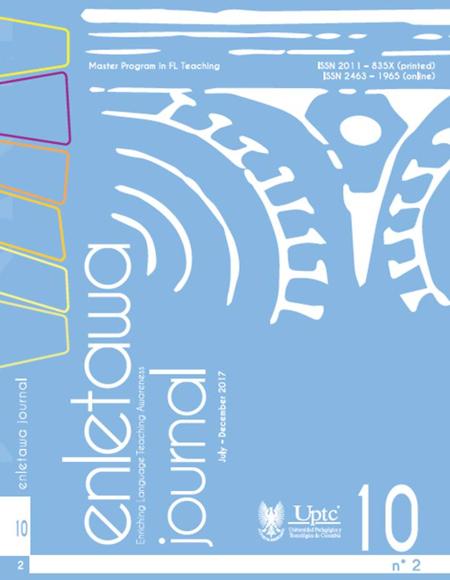Lights, Camera, Action! English learning through drama

Abstract
Over the past few years, learning English has gained significant importance throughout Colombia. In order for students to accomplish proficiency in this language, different strategies and methodologies are used to help improve their basic language skills. This article explores the use of drama as a strategy to develop two basic English language skills: reading and speaking. Additionally, social relationships among eleventh graders at a public institution are examined. Values, such as leadership, and the use of voice, body language, concentration, and shyness displayed during the activities were analyzed among the students. The most relevant findings form this experience are presented and described as a way to encourage teachers and students to think of drama as a useful pedagogical strategy applicable not only in linguistics, but in social and personal fields as well.
Keywords
Drama, English language, speaking skill, reading skill, social relationships, leadership, voice and body language
References
Andrade, A. (2007). Elementos de teatro. Mexico: Trillas.
Brown, H.D. (1994). Teaching by principles: An interactive approach to language pedagogy. Englewood Cliffs, NJ: Prentice Hall Regents.
Cabrera, J. (2014). ¿Son las técnicas tea-trales útiles para desarrollar habilidades de liderazgo en directivos de empresa? Madrid: Universidad Pontificia de comillas. Retrieved from: https://repositorio.comi llas.edu/ rest/bitstreams/335/retrieve
Camacho, B. (2008). Metodología de la investigación científica. Tunja: Universidad Pedagógica y Tecnológica de Colombia
Clipson, S. (2013). Teaching Primary English through Drama: A practical and creative Approach (2nd ed.). London: Routledge, Taylor & Francis group.
DBI Network. (2017). Drama- based instruction. Texas: University of Texas at Austin. Retrieved from: http://dbp. theatredance.utexas.edu/about
Dryden, J. (2012). Definition of drama. Bhavnagar, India. Literary theory and criticism Retrieved from: https:// sites.google.com /site/nmeictproject/ reflections/2-2-1-definition-of-drama
Ferrance, E. (2000). Action Research. Providence, Rhode Island: Brown University. Retrieved from: https://www.brown.edu/academics/educationalliance/sites/brown.edu.academics.education-alliance/files/publications/ act_research.pdf
Güngör, A. (2008). Effects of drama on the use of reading comprehension strategies and on attitudes towards reading. Florida. Journal for learning through the arts, 4 (1). Retrieved from: https://escholarship.org/uc/ item/4d62r6p9
Holmwood, C. (2014). Drama education and drama therapy. Exploring the space between disciplines. New York: Routledge, Taylor & Francis group.
Ministerio de Educación Nacional de Colombia. (2014). Plan nacional de inglés “Colombia very well”. Bogotá: MinEducación.
Perfetti, A. (2001). Reading skills. International encyclopedia of the social & behavioral sciences. Oxford: Pergamon. Retrieved from: http://www.pitt.edu/~perfetti/PDF/Reading%20skills.pdf
Pfister, M. (1991). The theory and analysis of drama. Cambridge: Cambridge University.
Ryan, D. and Kehoul, G. (2016). What is drama? Australia. Learning to learn in drama. Retrieved from: https:// resource.acu.edu.au/learndrama/ what_drama.htm
Sampieri, R. (2006). Metodología de la investigación. Mexico: McGraw Hill.